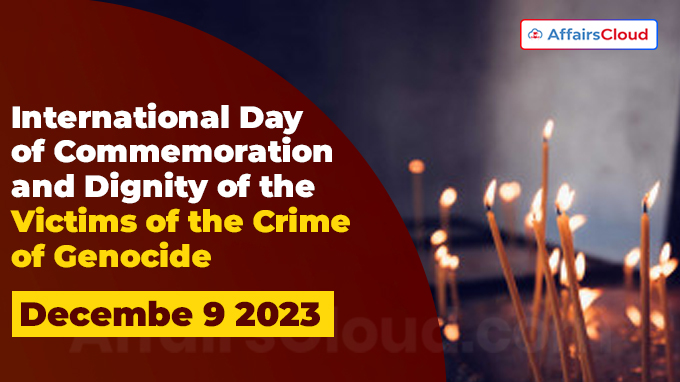 The United Nations (UN) International Day of Commemoration and Dignity of the Victims of the Crime of Genocide and of the Prevention of this Crime is annually observed across the globe on 9 December to mark the adoption of “Genocide Convention” – the Convention on the Prevention and Punishment of the Crime of Genocide, and to honour the victims of Genocide.
The United Nations (UN) International Day of Commemoration and Dignity of the Victims of the Crime of Genocide and of the Prevention of this Crime is annually observed across the globe on 9 December to mark the adoption of “Genocide Convention” – the Convention on the Prevention and Punishment of the Crime of Genocide, and to honour the victims of Genocide.
- The day creates awareness about the convention and its role in combating and preventing the crime of genocide.
9 December 2023 marks the 75th anniversary of adopting the Genocide Convention, the 1st human rights treaty adopted by the UN General Assembly (UNGA).
- Every year the UN Office on Genocide Prevention and Responsibility to Protect organises events to mark this day.
Theme 2023:
The theme of the 2023 observance is “A Living Force in World Society: The Legacy of the 1948 Convention on the Prevention and Punishment of the Crime of Genocide.”
- The theme highlights the achievements that derive from the Convention, to showcase its legacy, and also reflect on the challenges that remain for its effective implementation.
Background:
On 11 September 2015, the UNGA adopted the resolution A/RES/69/323 and proclaimed the 9 December of every year as the International Day of Commemoration and Dignity of the Victims of the Crime of Genocide and of the Prevention of This Crime.
- The day was first observed on 9th December 2015.
Genocide Convention:
i.The Genocide Convention was adopted by the UNGA by its resolution 260 A (III) on 9 December 1948.
ii.The Convention entered into force on 12 January 1951 after 20 States had ratified or acceded to it. To date, 153 States have ratified the Convention.
iii.The Convention signifies the international community’s commitment to “never again” after the atrocities committed during the World War II.
iv.It provides the 1st international legal definition of “genocide,” widely adopted at national and international levels, including in the 1998 Rome Statute of the International Criminal Court (ICC).
What is Genocide?
i.The word “genocide” (meaning “Killing”) was 1st coined by Polish lawyer Raphäel Lemkin in 1944 in his book Axis Rule in Occupied Europe.
ii.According to the convention, genocide is defined as killing or harming a part or all of a national, ethnical, racial or religious group with an intent to destroy the nation or the group. It is a crime that can take place both in times of war as well as in times of peace.
iii.Genocide was first recognised as a crime under international law in 1946 by the UNGA (A/RES/96-I).
- It was codified as an independent crime in the 1948 Genocide Convention.
Prevention of Genocide:
The Special Advisers on the UN’s Office on the Prevention of Genocide and on the Responsibility to Protect has developed a Framework of Analysis for Atrocity Crimes, a tool for prevention.
ii.The framework is a public document that provides an integrated analysis and risk assessment tool for atrocity crimes.
- The term “atrocity crimes” refers to 3 legally defined international crimes: genocide, crimes against humanity, and war crimes.
2023 Events:
A high-level event was organised on 8 December 2023, to mark International Day, as well as the 75th anniversary of the 1948 “Genocide Convention, at the UN Trusteeship Chamber in the UN Headquarters in New York, the United States of America(USA).




